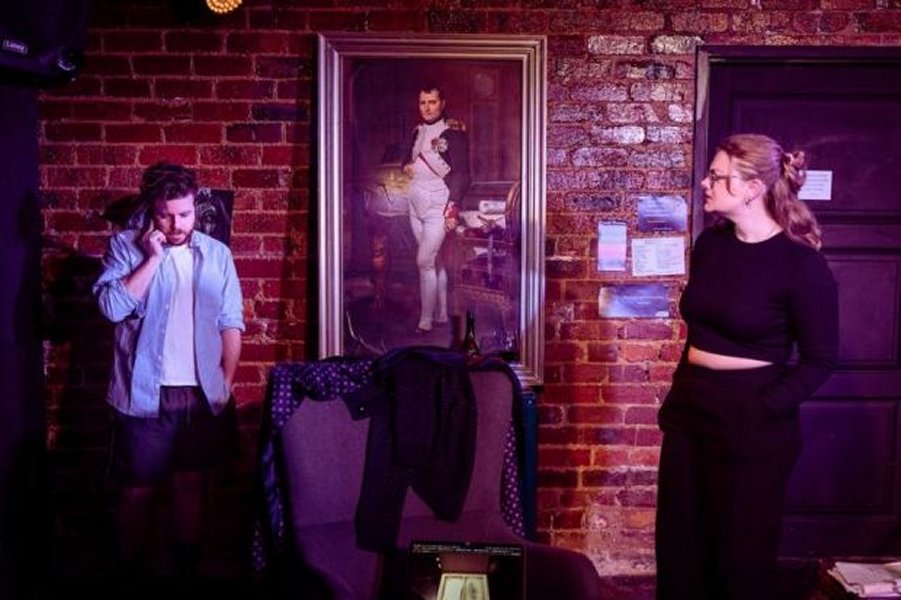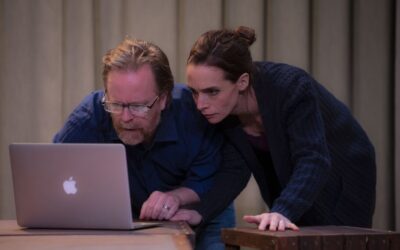By Darby Turnbull
I’m a huge admirer of romantic comedies, a genre much maligned as somehow being insubstantial mainly because their most devoted audience members consist of femme individuals, women, queer men etc and so complacently derided. But when done right they’re an electric deconstruction of sex and gender and the ways the chemistry between two people can erupt into physical or emotional farce, cringe, screwball slapstick and kinetic dialogue exchanges. Lately the pursuit of love and sex as a genre has moved into the fertile territory of ‘break up’ comedy or the ‘rebound comedy’.
Lily Hensby’s Last time is an intricate character study between two people, both writers reconnecting after a one-night stand for another round of sex and dry repartee. Lucas (Mark Yeates) is a slob, a patronising man child with an improbable degree of success with a piece of auto fiction on the way that depicts his supposed self-growth through his sexual relationships. Jesse (Lotte Beckett) is smart, cool, talented but whose work has hitherto been unrecognised. Lily Hensby is one of the few writers I’ve engaged with recently whose ear is so in tune to the ways millennial/Gen z people speak and communicate with each other and the ways she constructs the language into a duet of rapid-fire dialogue is enthralling from the very start. Mark Yeates and Lotte Beckett are both masterful performers and absolute dynamite together. The confidence and joy they both emit with this verbose, knowing and deeply layered text is palpable. Indelible pairs like Cary Grant and Katherine Hepburn/Rosalind Russell/Irene Dunn, Meg Ryan/Billy Crystal, Tom Hanks, Humphrey Bogart and Lauren Bacall; the tradition continues with the verbal and emotional charisma that Beckett and Yeates build with Hensby’s text smart, warm and incisive exchanges.
Lucas as played by Yeates is such a delightfully odious creation which Yeates imbues with clear eyed sincerity. There’s so little cynicism to his obliviousness but doesn’t undermine the sheer level of rage, frustration and mockery he can inspire. One of the funniest threads is his Napoleon fixation, a huge and expensive portrait of the General adorns his messy abode alongside pretentious quotes printed and sloppily tacked onto the walls.
Lotte Beckett is stupendous as the acerbic, cooly calibrated Jesse with a keen emphatic understanding of the costs of being the ‘cool girl’. She perfectly captures the complexity that emerges in encounters such as these. Aroused and repelled in equal measure and a burgeoning understanding of the ways the construction of our sexuality can come at the cost of the self. Hansby takes her character to such a fiercely resonant place that’s not only moving but deeply important for audiences to engage with. It’s a mature, frustrating and messy place to sit in and it’s laudable that Hensby chooses to be generous with both her characters letting them sit in an organic place that’s hopeful. And that hope is earned, though it’s limited because she knows that her characters’ work isn’t over.
It can’t be overstated just how well Yeates and Beckett navigate the efficiency with which Hensby has constructed her text and production. Their sexual magnetism is hilarious in its awkwardness, the real tension in their exploration of their roles as artists, Lucas’ buffoonish entitlement and childish impishness and Jesse’s amused disbelief at the sheer depths of his cluelessness that evolves into a palpable rage. The climax (not that one, that comes much earlier) a recitation from Lucas’ novel is so ripe in its second hand embarrassment the UN should really investigate the potential for torture characterisation. Lotte Becket gives a seminar in facial response as Yeates goes on and on, and on with self-satisfied piety, meanwhile we all collectively wince in our seats.
Last time is such a lovely fit for the intimacy of the Motley Bauhaus, a warm and cosy place to just revel in creatives excelling in the respective fields. As some
It can’t be overstated just how well Yeates and Beckett navigate the efficiency with which Hensby has constructed her text and production. Their sexual magnetism is hilarious in its awkwardness, the real tension in their exploration of their roles as artists, Lucas’ buffoonish entitlement and childish impishness and Jesse’s amused disbelief at the sheer depths of his cluelessness that evolves into a palpable rage. The climax (not that one, that comes much earlier) a recitation from Lucas’ novel is so ripe in its second-hand embarrassment the UN should really investigate the potential for torture characterisation. Lotte Becket gives a seminar in facial response as Yeates goes on and on, and on with self-satisfied piety, meanwhile we all collectively wince in our seats.
Last time is such a lovely fit for the intimacy of the Motley Bauhaus, a warm and cosy place to just revel in creatives excelling in the respective fields. As someone who has, of late, been measuring the effectiveness of a piece by how emotionally spent I feel after (where appropriate) it’s such a nice change to be so charmed by a production and leave feeling temporarily lighter than I walked in. Last time is such a great example of the standard of our local theatremakers and I just want the world for Lily Hensby and her collaborators and hope this piece gets more opportunities to shine; a tour, web series, tv series, a film? The potential is endless. one who has, of late been measuring the effectiveness of a piece by how emotionally spent I feel after (where appropriate) it’s such a nice change to be so charmed by a production and leave feeling temporarily lighter than I walked in. Last time is such a great example of the standard of our local theatremakers and I just want the world for Lily Hensby and her collaborators and hope this piece gets more opportunities to shine; a tour, web series, tv series, a film? The potential is endless.





